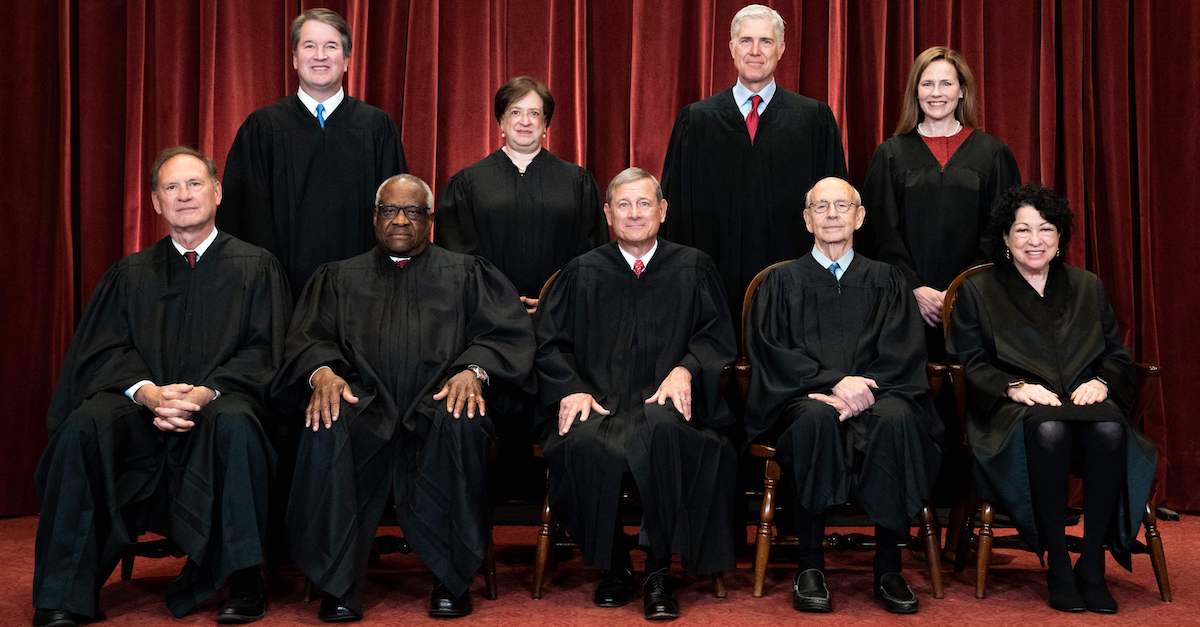
The Supreme Court of the United States handed down a long-awaited opinion in state-versus-state litigation over the fate of Obamacare. The justices ruled 7-2 against Texas and other state plaintiffs on the issue of standing, leaving open the question of the overall constitutionality or severability of the Affordable Care Act’s (ACA) individual mandate which requires Americans to carry health insurance.
The case, styled for Supreme Court purposes as California v. Texas, involved a group of eighteen states (including Texas) and two individuals (Neill Hurley and John Nantz) as plaintiffs. The defendants were the United States, federal officials with the Department of Health and Human Services and the Internal Revenue Service, and more than a dozen states, including California.
The plaintiffs hoped to convince the Court that the entire ACA must be invalidated because, in their view, the individual mandate is unconstitutional. Oral arguments, however, focused more on the question of whether an offending portion of the statute could be cut out and “severed” from the ACA, leaving the rest of the statute intact.
The justices essentially opted out of deciding juicier questions of constitutionality and severability. Instead, they simply ruled that the plaintiffs simply had no right to sue. The Court ruled that Texas and the others lacked standing to challenge the ACA under any appropriate theory of law.
The Court’s elder justice, Stephen Breyer, delivered the majority opinion. Beginning with a straightforward denial of standing, Breyer wrote that “[n]either the individual nor the state plaintiffs have shown that the injury they will suffer or have suffered is ‘fairly traceable’ to the ‘allegedly unlawful conduct’ of which they complain.”
The problem, Breyer explained, is that there is currently no mechanism for the government to enforce the individual mandate. The ACA requires health insurance for individuals, but the current version of the law — passed under Republican leadership — imposes no penalty for those who do not comply. Under President Obama, the law forced those who did not carry health insurance to pay a tax penalty.
As Breyer noted, the penalty provision has been “zeroed out.” Therefore, “there is no possible Government action that is causally connected to the plaintiffs’ injury — the costs of purchasing health insurance,” Breyer reasoned.
Not only do the individual plaintiffs have no claim for damages, they also similarly lack a claim for an injunction against the individual mandate.
“There is no one, and nothing, to enjoin,” Breyer wrote. “The individual plaintiffs cannot enjoin the Secretary of Health and Human Services, because he has no power to enforce §5000A(a) against them. And they do not claim that they might enjoin Congress,” he continued.
On the issue of the states themselves that sued, the Court reached the same conclusion. The states claimed they had an indirect injury in that the ACA caused increased use of state-operated medical insurance programs and caused increased administrative expenses. SCOTUS wasn’t buying that argument. Breyer pointed out the lack of nexus between the ACA’s individual mandate and the costs claimed by the states:
Unsurprisingly, the States have not demonstrated that an unenforceable mandate will cause their residents to enroll in valuable benefits programs that they would otherwise forgo. It would require far stronger evidence than the States have offered here to support their counterintuitive theory of standing.
Justice Clarence Thomas concurred with the judgment, but he had a distinctly negative take on the Court’s handling of the individual mandate as a general matter.
“This Court has gone to great lengths to rescue the Act from its own text,” wrote Thomas. “So have the Act’s defenders, who argued in first instance that the individual coverage mandate is the Act’s linchpin, yet now, in an about-face, contend that it is just a throwaway sentence.” Thomas went on to point out that Justice Samuel Alito (one of the two dissenters in the opinion) is equally bothered by a shift in narrative that “transformed [the individual mandate] from the cornerstone of the law into a standalone provision.”
Allowing that “whatever the Act’s dubious history in this Court, we must assess the current suit on its own terms,” Thomas acquiesced that the lawsuit before the Court is simply not the right vehicle to successfully challenge the ACA.
Thomas ended his concurrence with a critical word for the majority with which he agreed: “Although this Court has erred twice before in cases involving the Affordable Care Act, it does not err today.”
Justice Alito’s lengthy dissent (in which Justice Neil Gorsuch joined) almost playfully refers to the case as “the third installment in our epic Affordable Care Act trilogy” — in which “the Court is presented with the daunting problem of a ‘tax’ that does not tax.”
Alito criticized the majority, writing that “[i]nstead of defending the constitutionality of the individual mandate, the Court simply ducks the issue and holds that none of the Act’s challengers, including the 18 States that think the Act saddles them with huge financial costs, is entitled to sue.”
Reasoning that “the ACA imposes many burdensome obligations on States in their capacity as employers” and that “[e]ven $1 in harm is enough to support standing,” Alito questions the consistency of the majority’s ruling.
Alito went on to note that in the recent past, states have been permitted to wage lawsuits over costs related to exemptions from contraceptive mandates or costs from environmental regulations — and that Texas and the other state plaintiffs in this case should have been allowed to do the same.
The high court’s ruling means that the ACA, including its individual mandate, will stay in full force and effect.
[image via Erin Schaff /POOL/AFP via Getty Images]
Have a tip we should know? [email protected]